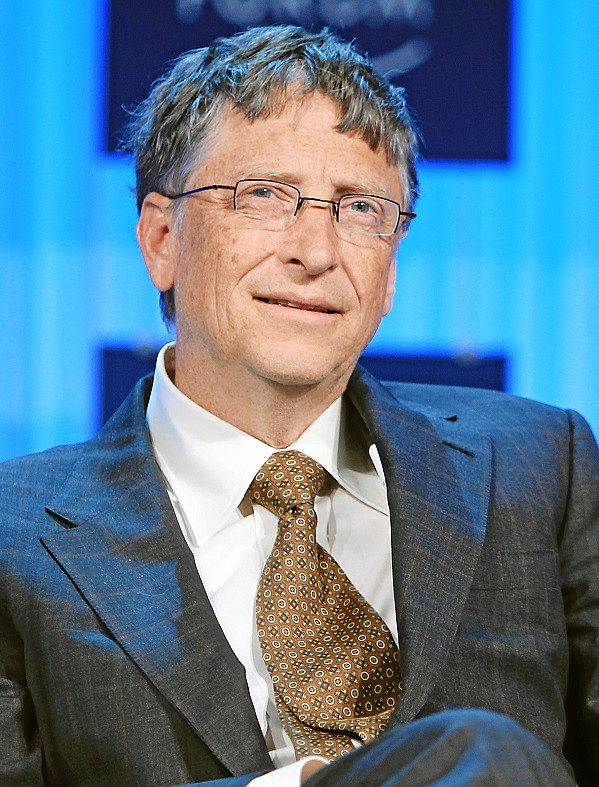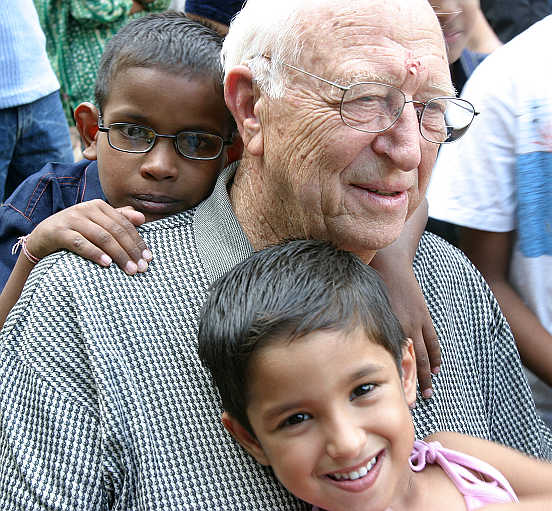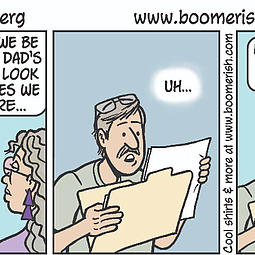Bill Gates' Personal Connection to Alzheimer's
November 1, 2018 at 9:49 a.m.
November is National Alzheimer’s Disease Awareness Month
“Alzheimer’s is the only disease with no cure, no treatments to stop, delay or prevent the disease—and no survivors. But this will change. The first survivor of Alzheimer's is out there,” proclaims the Alzheimer’s Association.
Nearly six million Americans and their families struggle with Alzheimer’s disease, including Bill Gates’ father, 93-year old Bill Gates II. People are living longer than ever before, which should be a wonderful thing. “But what happens when it is not?” Bill Gates asked on his blog, GatesNotes.com. A long life is not enough. “People should be able to enjoy their later years…But of all the disorders that plague us late in life, one stands out as a particularly big threat to society: Alzheimer’s disease.”
Bill Gates has committed to donate more than 100 million dollars towards finding a cure. The financial burden of Alzheimer’s on healthcare systems is one of the fastest growing in developed countries, and one that will continue to grow without a breakthrough in prevention or treatment.
More devastating, as Gates knows from personal experience: “The human cost of Alzheimer’s is much more difficult to put into numbers.” His experience has exposed him to how hopeless it feels when you or a loved one develops Alzheimer’s. “It’s a terrible disease that devastates both those who have it and their loved ones. This is something I know a lot about, because men in my family have suffered from Alzheimer’s. I know how awful it is to watch people you love struggle as the disease robs them of their mental capacity, and there is nothing you can do about it. It feels a lot like you’re experiencing a gradual death of the person that you knew.
“When I announced that I was investing in Alzheimer’s research for the first time last fall, I thought I knew what to expect,” Bill Gates wrote in July on his blog post, Why diagnosing Alzheimer’s today is so difficult—and how we can do better. “The things I’ve seen over the last seven months make me more hopeful than ever…What I didn’t see coming was the amazing response I got from the Alzheimer’s community at large. Because my family didn’t talk publicly about my dad’s diagnosis before the announcement, I had yet to experience how remarkable the support community is.”
Gates discussed his involvement with Alzheimer’s research earlier this year with Maria Shriver on NBC’s Today show. “I really believe that if we orchestrate the right resources, it’s solvable.” In 2017 alone, Americans spent 259 billion dollars caring for loved ones with Alzheimer’s and other dementias, according to the Alzheimer’s Association. Despite billions more spent on research, scientists don’t know what causes Alzheimer’s or have effective treatments.
“Too many Alzheimer’s dollars are going towards mainstream treatments that don’t work,” said Gates. In answer to a reader question through his blog, How close are we getting to understanding and curing Alzheimer’s? Gates answered, “I’m optimistic that we’ll see a significant breakthrough within the next 10 to 20 years. Our understanding of how the brain ages is advancing a great deal, and that’s fueling a lot of promising research in new areas. Most of the drug trials so far have focused on two specific pathways to treatment (amyloid and tau). I hope those approaches succeed, but I’m excited that scientists are also beginning to explore less mainstream targets. A more diverse drug pipeline will increase our odds of discovering a breakthrough.”
To that end, half of Gates’100 million-dollar investment is going to the Dementia Discovery Fund (www.theddfund.com), an organization that invests in novel science looking to cure dementia. More recently, he committed an additional $30 million into developing (along with a coalition of other philanthropists) the Diagnostics Accelerator, part of the Alzheimer’s Drug Discovery Foundation. This project aims to speed-up the creation of new ideas for an earlier and better diagnosis of Alzheimer’s. The work includes efforts to develop biomarkers to detect Alzheimer's disease early.
“Imagine a world where diagnosing Alzheimer's disease is as simple as getting your blood tested during your annual physical,” noted Gates.
“We’re already making progress— but we need to do more… With all of the new tools and theories in development, I believe we are at a turning point in Alzheimer’s R&D,” writes Gates.
The work that Gates is involved with includes targeting five major strategies in the fight against Alzheimer’s disease:
• Greater understanding of how the disease develops
• Improving diagnostics
• Developing innovative approaches to treatment
• Simplifying trial enrollment
• Creating a shared database from those trials.
“I believe there is a solution," Gates told Dr. Sanjay Gupta, CNN chief medical correspondent. “Any type of treatment would be a huge advance from where we are today.” But, he added, the long-term goal has got to be a cure. Targeting Alzheimer’s will mean treating the disease and causes rather than just the symptoms—early detection and early intervention are crucial.
“One of the things we’re trying to figure out is, when does the Alzheimer’s really get started?” he told Maria Shriver on the Today show. “When would you need to treat somebody to completely avoid them getting Alzheimer’s?”
With his family history, is Gates worried about developing Alzheimer’s himself? It is one of his greatest fears because he has seen the hardship it has caused in his own family, he admitted to Gupta. “I hope I can live a long time without those limitations,” he adds. For now, he is focused on his own personal prevention by exercising and staying mentally engaged.
“My job’s perfect, because I’m always trying to learn new things and meeting with people who are explaining things to me. You know, I have the most fun job in the world,” he told Dr. Gupta with a smile.
The Alzheimer’s Association 24/7 Helpline provides reliable information and support to all those who need assistance. Call toll-free anytime day or night:1-800-272-3900






